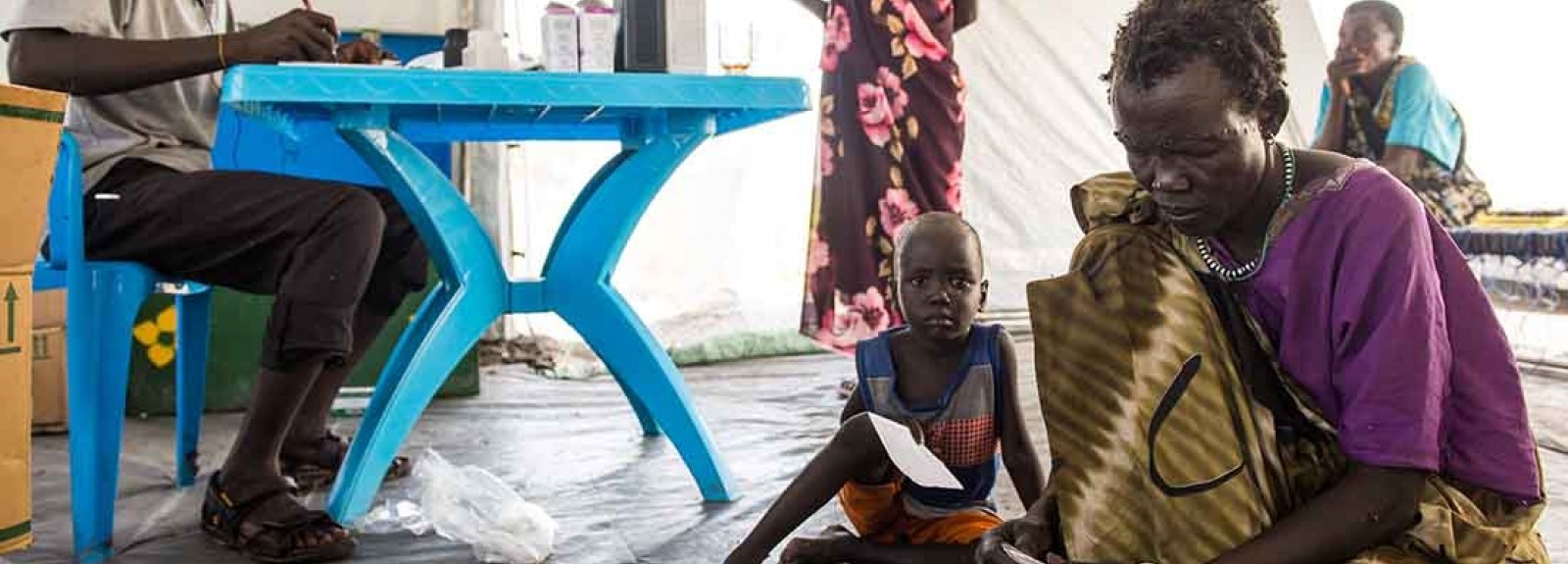
I
n the midst of ongoing violence in South Sudan, an estimated 2.3 million people have been forced from their homes. Most are not involved in the conflict in any way: beautiful souls, living in fear, struggling to survive.
One of their most basic needs as they wait for more peaceful times is access to primary health care.
While more than 700,000 have fled the country due to the war, another 1.6 million are internally displaced, struggling to carry on in make-shift settings. IMA World Health and our partners have continued to provide basic health services to thousands of displaced people in the Upper Nile and Jonglei states. Curative and preventive primary health care, nutrition services for children, reproductive health services, delivery of essential medicines, management of neglected tropical diseases, malaria prevention, and training of health workers continue despite conflict that has displaced staff, destroyed facilities and all but severed logistical lifelines.
IMA works alongside South Sudan’s Ministry of Health, civil society, donors and other critical partners to staff health centers, maintain operations and work to provide health and healing, regardless of who is fighting whom. While working to ensure quality health services are available in the immediate-term wherever people are, IMA’s longer-term goal is to strengthen the capacity of health systems through the states.
But there are many challenges.
A lack of security in the country continues to be the greatest hurdle. Tensions remain high in some areas, limiting access. “Without a secure environment, you are challenged to do the supervision that you are supposed to do and some activities can’t be done,” Dr. Mounir Christo Lado Lugga, IMA’s Country Director in South Sudan, said. Activities such as door-to-door campaigns, for instance, aren’t an option.
Even apart from the current unrest, the annual rainy season makes basic functions difficult. “When it rains, the terrain is so bad that movement becomes a challenge,” Lado said. Large swaths of Jonglei turn into swamps. Almost all airstrips are dirt—until they become mud. As a way to work around impassable roads, IMA has taken to the Nile to transport medicines and supplies into Jonglei and Upper Nile states. But that’s also not an option now, as barges have become a target for the warring sides.
“River transport is not operational,” Lado said.
County Health Departments had vehicles, such as motorcycles and boats, that staff members and health workers needed for their work, but most of these were looted. And the solar refrigerators that were used to keep temperature-sensitive vaccines and medicine cold during transport have been either damaged or stolen.
As if immobility and insecurity aren’t daunting enough, there is also the issue of the country’s economic crisis. There is a daily floating rate of the South Sudan Pound, Lado explained, which makes procurement difficult. By the time a vendor is selected, the prices have changed. “You do your calculation on a daily basis,” he said. The annual inflation rate in South Sudan surged to 661.3 percent in July 2016.
But hope is persistent and commitment undaunted.
Before the crisis that began in mid-December 2013, Upper Nile and Jonglei states were showing improvement in health service delivery. Lado said all the health indicators were good and, despite all of last year’s challenges, IMA and our partners, such as Sudan Medical Care, were still able to meet 70 percent of the targets for health indicators. This statistic not only shows that health services continue but also that the team in South Sudan is still able to maintain essential communications despite the fog of conflict.
A staggering 20 percent of South Sudan’s population is displaced in some form, according to the 2016 Global Peace Index released in June. The men, women and children who are caught in the middle of this ongoing conflict deserve to lead healthy and productive lives. Despite great adversity, IMA and our partners continue to support the people of South Sudan.
“You cannot imagine the resilience that is necessary,” Lado said. “It’s not easy, but we work together to make sure health services continue. Because they are desperately needed.”
IMA’s work in South Sudan is funded by Global Fund/Population Services International, Global Fund/UNDP, Office of U.S. Foreign Disaster Assistance, UK’s Department for International Development/Mott MacDonald, UNFPA, and World Bank/South Sudan Ministry of Health.


